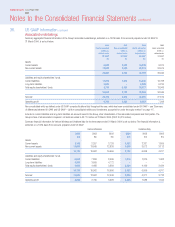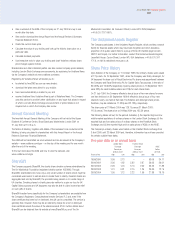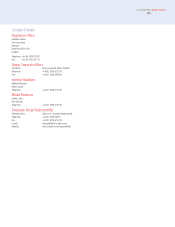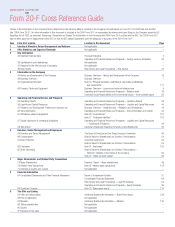Vodafone 2004 Annual Report Download - page 133
Download and view the complete annual report
Please find page 133 of the 2004 Vodafone annual report below. You can navigate through the pages in the report by either clicking on the pages listed below, or by using the keyword search tool below to find specific information within the annual report.
Annual Report 2004 Vodafone Group Plc
131
(together with any connected person) is a shareholder or an officer or is otherwise
interested, provided that the director (together with any connected person) is not
interested in 1% or more of any class of the company’s equity share capital or the
voting rights available to its shareholders, (e) relating to the arrangement of any
employee benefit in which the director will share equally with other employees and (f)
relating to any insurance that the Company purchases or renews for its directors or
any group of people, including directors.
The directors are empowered to exercise all the powers of the Company to borrow
money, subject to the limitation that the aggregate amount of all liabilities and
obligations of the Group outstanding at any time shall not exceed an amount equal to
1.5 times the aggregate of the Group’s share capital and reserves calculated in the
manner prescribed in the Articles of Association, unless sanctioned by an ordinary
resolution of the Company’s shareholders.
In accordance with the Company’s Articles of Association and best practice in UK
corporate governance, a third of all the directors retire at each Annual General
Meeting. The specific retiring directors are those last elected or re-elected at or before
the Annual General Meeting held in the third calendar year before the current year.
No person is disqualified from being a director or is required to vacate that office by
reason of age. If at a general meeting a director who is 70 or more years of age is
proposed for election or re-election, that director’s age must be set out in the notice of
the meeting.
Directors are not required to hold any shares of the Company as a qualification to act
as a director.
Finally, and in accordance with best practice in the UK for corporate governance,
compensation awarded to executive directors is decided by a remuneration committee
consisting exclusively of non-executive directors.
In addition, as required by The Directors’ Remuneration Report Regulations, the Board
has, since 2003, prepared a report to shareholders on the directors’ remuneration
which complies with the Regulations (see pages 54 to 63). The report is also subject
to a shareholder vote.
Rights attaching to the Company’s shares
Dividends rights
Holders of the Company’s ordinary shares may by ordinary resolution declare
dividends but may not declare dividends in excess of the amount recommended by
the directors. The directors may also pay interim dividends. No dividend may be paid
other than out of profits available for distribution. Dividends on ordinary shares will be
announced in pounds sterling. Holders of ordinary shares with a registered address in
a Euro-zone country (defined, for this purpose, as a country that has adopted the Euro
as its national currency) will receive their dividends in Euro, exchanged from pounds
sterling at a rate fixed by the directors in accordance with the Articles of Association.
Dividends for ADS holders represented by ordinary shares held by the Depositary will
be paid to the Depositary in US dollars, exchanged from pounds sterling at a rate fixed
by the directors in accordance with the Articles of Association, and the Depositary will
distribute them to the ADS holders.
If a dividend has not been claimed for one year after the later of the resolution passed
at a general meeting declaring that dividend or the resolution of the directors providing
for payment of that dividend, the directors may invest the dividend or use it in some
other way for the benefit of the Company until the dividend is claimed. If the dividend
remains unclaimed for 12 years after the relevant resolution either declaring that
dividend or providing for payment of that dividend, it will be forfeited and belong to the
Company.
Voting rights
The Company’s Articles of Association provide that voting on Substantive Resolutions
(i.e. any resolution which is not a Procedural Resolution) at a general meeting shall be
decided on a poll. On a poll, each shareholder who is entitled to vote and is present in
person or by proxy has one vote for every share held. Procedural Resolutions (such as
a resolution to adjourn a General Meeting or a resolution on the choice of Chairman of
a General Meeting) shall be decided on a show of hands, where each shareholder who
is present at the meeting has one vote regardless of the number of shares held,
unless a poll is demanded. In addition, the Articles of Association allow persons
appointed as proxies of shareholders entitled to vote at general meetings to vote on a
show of hands, as well as to vote on a poll and attend and speak at general meetings.
Holders of the Company’s ordinary shares do not have cumulative voting rights.
Under English law, two shareholders present in person constitute a quorum for
purposes of a general meeting, unless a company’s articles of association specify
otherwise. The Company’s Articles of Association do not specify otherwise, except that
the shareholders do not need to be present in person, and may instead be present by
proxy, to constitute a quorum.
Under English law, shareholders of a public company such as the Company are not
permitted to pass resolutions by written consent.
Record holders of the Company’s ADSs are entitled to attend, speak and vote on a poll
or a show of hands at any general meeting of the Company’s shareholders by the
Depositary’s appointment of them as corporate representatives with respect to the
underlying ordinary shares represented by their ADSs. Alternatively, holders of ADSs
are entitled to vote by supplying their voting instructions to the Depositary or its
nominee, who will vote the ordinary shares underlying their ADSs in accordance with
their instructions.
Liquidation rights
In the event of the liquidation of the Company, after payment of all liabilities and
deductions in accordance with English law, the holders of the Company’s 7%
cumulative fixed rate shares would be entitled to a sum equal to the capital paid up on
such shares, together with certain dividend payments, in priority to holders of the
Company’s ordinary shares. The holders of the fixed rate shares do not have any other
right to share in the Company’s surplus assets.
Pre-emptive rights and new issues of shares
Under Section 80 of the Companies Act, directors are, with certain exceptions, unable
to allot relevant securities without the authority of the shareholders in a general
meeting. Relevant securities as defined in the Companies Act include the Company’s
ordinary shares or securities convertible into the Company’s ordinary shares. In
addition, Section 89 of the Companies Act imposes further restrictions on the issue of
equity securities (as defined in the Companies Act, which include the Company’s
ordinary shares and securities convertible into ordinary shares) which are, or are to
be, paid up wholly in cash and not first offered to existing shareholders. The
Company’s Articles of Association allow shareholders to authorise directors for a
period up to five years to allot (a) relevant securities generally up to an amount fixed
by the shareholders and (b) equity securities for cash other than in connection with a
rights issue up to an amount specified by the shareholders and free of the restriction
in Section 89. In accordance with institutional investor guidelines, the amount of
relevant securities to be fixed by shareholders is normally restricted to one third of the
existing issued ordinary share capital, and the amount of equity securities to be issued
for cash other than in connection with a rights issue is restricted to 5% of the existing
issued ordinary share capital.
Disclosure of interests in the Company’s shares
There are no provisions in the Articles whereby persons acquiring, holding or
disposing of a certain percentage of the Company’s shares are required to make























